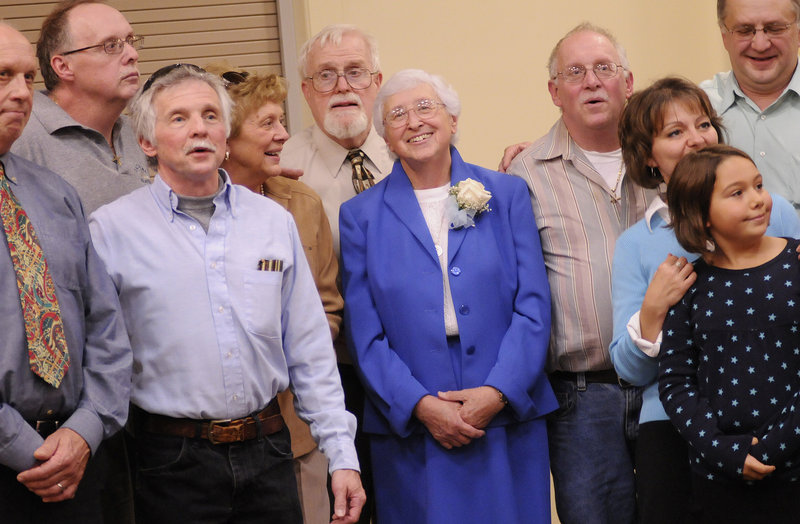PORTLAND — Sixty years ago, Mary Fasulo took vows at a church altar as her loved ones witnessed her devotion.
Following the ceremony, Fasulo, then 19, stepped out of her elegant wedding gown, cropped her beautiful reddish-brown hair and donned a simple black dress with matching black stockings and a veil.
Fasulo became neither a bride nor a widow on that day. Rather, she pledged herself to a life of poverty, chastity and obedience to serve the poor, sick and uneducated as a nun for the Sisters of Mercy, an international order founded in Dublin in 1831 and dedicated to espousing the ideals of its founder, Catherine McAuley, and the Roman Catholic faith.
FAMILY DOUBTED COMMITMENT
While her peers unpacked their wedding trousseaus to set up house and start families, Fasulo entered convent life at the St. Joseph’s Convent motherhouse on Stevens Avenue. She arrived with just one trunk, filled with the most basic possessions.
“Many of my siblings didn’t think I was serious,” said Fasulo. “One brother, who dropped my trunk off at the convent, told the sisters, ‘Don’t bother putting it up on the third floor because I’ll have to come back and get it in two weeks.’“
That day never came.
Fasulo went on to teach schoolchildren for 34 years, followed by 20 years of administrative work for the church. Now retired, she volunteers.
Looking back, Fasulo said, “I have no regrets. This is the life I wanted.”
Sister Mary Morey took her religious vows in 1960, at age 18, saying she was inspired to do so after seeing other religious sisters’ “love for God, generosity and fidelity to the mission.”
Morey now serves as missions integration director at St. Andre Health Care Facility in Biddeford, where she is responsible for religious education programming and community outreach.
Fasulo and Morey were among nine Sisters of Mercy who recently were celebrated as jubilarians for their years of service to the order. The others included Sister Nola Wells, with 80 years’ service; sisters Ruth Hurtubise, Joyce Mahany, Mary Jude Murray and the late Sister Josephine Flanagan, with 60 years of service; and sisters Judith McNamara and Priscilla Murray, with 50 years of service.
Flanagan, whom Morey described as “a woman of tremendous faith, humor and kindness,” died just 10 days after the celebration. She was Catherine McAuley High School’s first principal and an associate dean at Saint Joseph’s College.
The sisters organized the celebration, selecting special music and readings for a Mass presided over by Bishop Richard Malone in St. Joseph’s Chapel at the convent. Lunch followed at the Italian Heritage Center, where the sisters received their guests, small tokens of appreciation and monetary gifts to charitable organizations in their names.
FELLOW SISTERS BECOME FAMILY
Early on, many of the honorees lived among 100 or so nuns at the motherhouse, a sprawling four-story living space featuring an auditorium, classrooms and visiting parlors. They daily rose at 5 a.m. for prayers, chapel services and a simple breakfast and regrouped for supper, more devotions and chores before going to bed at 9 p.m.
Novices lived in a dormitory setting while studying the foundations of their faith. Graduates of theology school moved into their own personal quarters at the convent and went on to serve the church and society in vocations such as teaching, nursing and various forms of administration. Personal earnings were pooled to benefit all members of the order.
Though it was a disciplined line, Fasulo said it was a far cry from a quiet monastery setting.
“I think a lot of people pitied us, but we had a great time,” she said. “We put on plays and sang and did things together.”
Not allowed to go home in the early days, the sisters became their own family unit, supporting each other during lonely times.
“That training taught us how to comfort others that we would later encounter in ministry,” said Fasulo.
The sisters have adapted to many changes over time – some welcome, others difficult.
The traditional black and white habits were retired in favor of business casual or modest attire. Now, the only outward symbols of the sisters’ devotion are a simple silver wedding band and a crucifix known as the Mercy Cross.
And as the Catholic Church downsized and the sisters’ population dwindled, the once-bustling convent was converted into office space, with the nuns transitioning to an apartment complex. The building reportedly will be sold and converted into public housing units.
WEATHERING YEARS OF CHANGE
“Closing the motherhouse was painful,” said Fasulo. “It was our home and our heritage. But we couldn’t afford the upkeep.”
Once again, those vows of poverty and the care of others help to bring things into perspective for the sisters. They are content to serve simply with what God puts into their hands.
Reflecting on her service, Morey said, “It has been a wonderful life” and “a great adventure.”
“I am humbled and grateful to God for this gift of sharing life with women of such great gifts and depths of spirituality,” said Morey. “It has been a privilege to touch the lives of so many others over the years.”
Staff Writer Deborah Sayer can be contacted at 791-6308 or at: dsayer@pressherald.com
Copy the Story Link
Send questions/comments to the editors.



Success. Please wait for the page to reload. If the page does not reload within 5 seconds, please refresh the page.
Enter your email and password to access comments.
Hi, to comment on stories you must . This profile is in addition to your subscription and website login.
Already have a commenting profile? .
Invalid username/password.
Please check your email to confirm and complete your registration.
Only subscribers are eligible to post comments. Please subscribe or login first for digital access. Here’s why.
Use the form below to reset your password. When you've submitted your account email, we will send an email with a reset code.